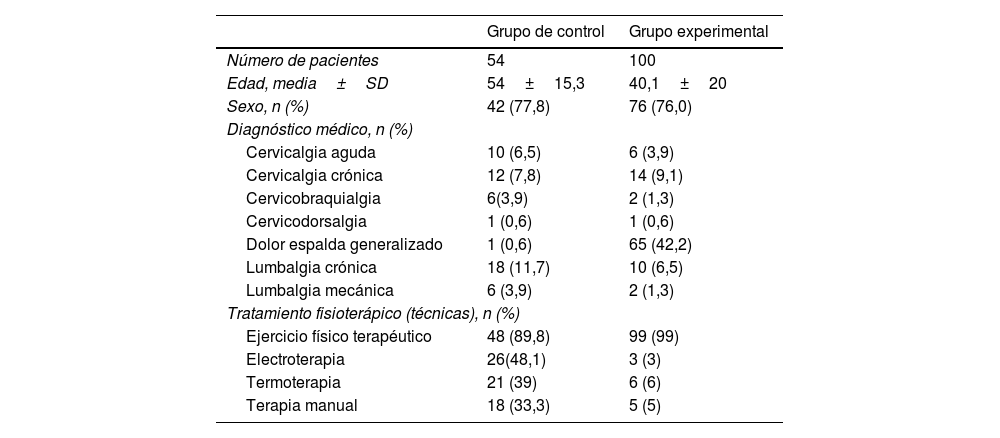Evaluar la efectividad de la entrevista motivacional (EM) junto al tratamiento fisioterapéutico habitual en pacientes con trastornos musculoesqueléticos (TME) de la espalda en atención primaria (AP).
MétodosEstudio cuasiexperimental en pacientes que iniciaron su tratamiento en el año 2020 en una unidad de fisioterapia tras diagnóstico médico de TME en la espalda, con seguimiento prospectivo de 2grupos con actuación terapéutica: grupo experimental (GE) y grupo de control (GC). Se empleó la EM solo en el GE. A ambos grupos se les entrevistó telefónicamente a los 3y 6meses de finalizar el tratamiento fisioterápico, preguntando por el cumplimiento de pautas domiciliarias y por la percepción subjetiva del estado de salud (escala de Barthel). Se ajustaron modelos de regresión lineales (coeficiente de regresión, IC del 95%) y logísticos (OR, IC del 95%).
ResultadosLa población de estudio fue de 154 personas (76,6% mujeres). La salud percibida fue significativamente mejor (p<0,001) en el GE que en el GC, tanto a los 3meses de seguimiento (7,4 versus 5,0, respectivamente) como a los 6(7,1 versus 4,6, respectivamente). Hubo una fuerte asociación entre percepción de salud y cumplimiento (coeficiente de regresión 3,0 [IC del 95%=2,5-3,4]). La asociación entre la EM y el cumplimiento terapéutico se mantuvo tras ajustes multivariados (OR a 6meses=383,6 [IC del 95% = 31,0-4.742,4]).
Conclusionesla incorporación de la EM como complemento de los tratamientos de fisioterapia es una herramienta factible y efectiva para mejorar el cumplimiento de las pautas domiciliarias y la percepción subjetiva de salud.
To evaluate the effectiveness of motivational interviewing (MI) combined with the usual physiotherapy treatment in patients with back musculoskeletal disorders (MSD) in primary care (PC).
MethodsQuasi-experimental study with 2groups with therapeutic action (control group and experimental group) and prospective follow-up, in a physiotherapy unit in PC, in patients who began their treatment in 2020, with a medical diagnosis of MSD in the back. MI was used only in the face-to-face visits of the experimental group. Both groups were interviewed by telephone about 3and 6months after finishing the physiotherapy treatment. For this purpose, the Barthel scale was used for the subjective perception of the state of health, and the scale of compliance with home guidelines. Linear (regression coefficient, 95% CI) and logistic (OR, 95% CI) regression models were fitted.
ResultsThe study population was 154 people (76.6% women). Perceived health was significantly better (P<.001) in the experimental group than in the control group, both at 3(7.4 versus 5.0, respectively) and at 6months of follow-up (7.1 versus 4.6, respectively). There was a strong association between perceived health and compliance (regression coefficient 3.0 [95% CI=2.5–3.4]). The strong association between MI and treatment adherence was maintained after multivariate adjustments (6-month OR=383.6 [95% CI 31.0–4742.4]).
ConclusionsMI is a feasible and effective complement to physiotherapy treatments to improve compliance with home recommendations and subjective perception of health.
Article
Si ya tiene sus datos de acceso, clique aquí.
Si olvidó su clave de acceso puede recuperarla clicando aquí y seleccionando la opción "He olvidado mi contraseña".











